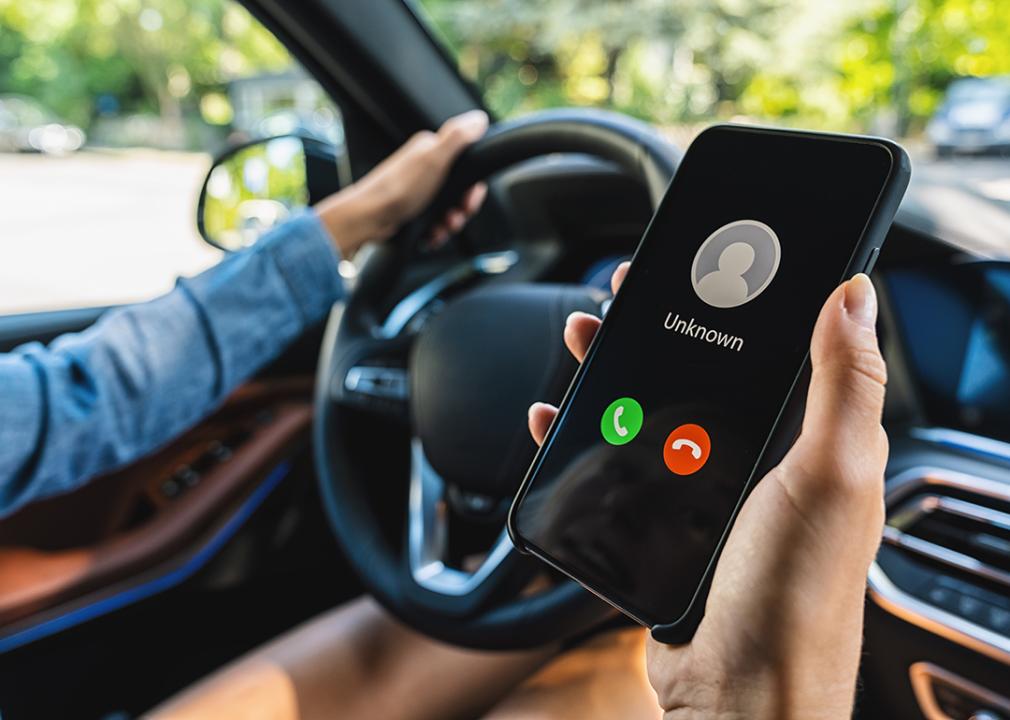Are car extended warranty calls a scam?

r.classen // Shutterstock
Are car extended warranty calls a scam?
Person inside a car looking at an incoming unknown call.
Calling from a local number, “Brian” has some important news about your car warranty. Do you have a moment to listen? The first time, possibly. Senior citizens in particular are more likely to indulge an unknown caller. Once you’ve received multiple calls in the same day, however, you’ll be more than familiar with the car extended warranty call scam. These unsolicited calls account for the most common complaint to the Federal Communications Commission, and their frequency has surged as more used cars come onto the market post-pandemic. Spokeo shares how to avoid falling victim to a particularly irritating and pervasive scam.
How Does the Car Extended Warranty Call Go?
The sophistication of these calls ranges from the crude to the convincing. At the lower end, an apparently automated voice—reading from a script but claiming to be your car dealer, manufacturer, or insurer—informs you that your car warranty is due to expire soon and asks you to press a button for more information.
The scam calls that are harder to identify come from a real, human caller who shares accurate details about your current car make and model, mileage, insurance, and current warranty. Using high-pressure sales tactics and some simple social engineering, they ask you to confirm your personal details (social security number, credit card details, etc.) and purchase an extended warranty. To stimulate your guilt, they claim to have already sent you numerous requests by mail. To provoke action, they urge you to seize a “one-time-only” offer that you can cancel easily—or they threaten to close your file altogether.
What’s Really Going On?
In most cases, these callers are scammers posing as legitimate warranty companies or insurers. Either way, there is no warranty. At best, you’ll end up with a phony service contract that is full of loopholes and fine print, leaving you with no cover when you actually need to make repairs. At worst, the purpose is simply to steal your card details for a more ambitious fraud.
What Does the Law Say?
Did you know that telemarketers are required by law to display a genuine number? Probably not, and scammers know that you don’t. They’re also counting on the fact that victims are unaware that most pre-recorded telemarketing calls have been banned since 2009. Even if Americans made 197,000 complaints about unwanted robocalls in the last six months of 2020 alone, that’s a fraction of the total number of calls going through each day.
Spot These Red Flags That It’s Bogus
Unfortunately, it’s getting harder to spot the phony phone calls. Pre-recorded voices that don’t pause even if you interrupt are a giveaway, but with today’s technology the lines between human and machine are blurred. Likewise, it used to be easy to block an unknown number or suspicious 800 number with caller ID, but today it’s also easy for scammers to spoof a legitimate number, call from a local number then “transfer” you, or call from overseas using a VoIP in the U.S. That leaves the most reliable red flag of all—the words “extended car warranty.”
What Are the Risks?
Scammers will try to pressure you into purchasing an extended warranty that is, in fact, a poor quality vehicle service contract. Not only will it be overpriced, perhaps by as much as $3,000, but it will offer incomplete or invalid coverage when you actually try to use it. If you did spot the scam and tried to get a refund, the funds have usually been transferred beyond the jurisdiction of U.S. authorities. Some victims are successful in getting their money back. In 2019, the FCC returned $4 million to about 6,000 people with funds raised from fines under the Telephone Consumer Protection Act.
How To Protect Yourself
The secret with unsolicited calls is to not engage with them at all. Ideally, that means using caller ID to screen calls, but if you’ve already answered, simply hang up without speaking. Do not press a button if requested, even if you are told doing so will remove you from the call list. The real purpose is to identify you as a real person with an active number and bombard you with even more scam calls. If this happens, log your number with the Federal Trade Commission Do Not Call List. The only company with which you should be sharing personal information is the one listed on your current car warranty. Call it directly to confirm if there is any action required.
![]()
This story was produced by Spokeo and reviewed and distributed by Stacker Media.